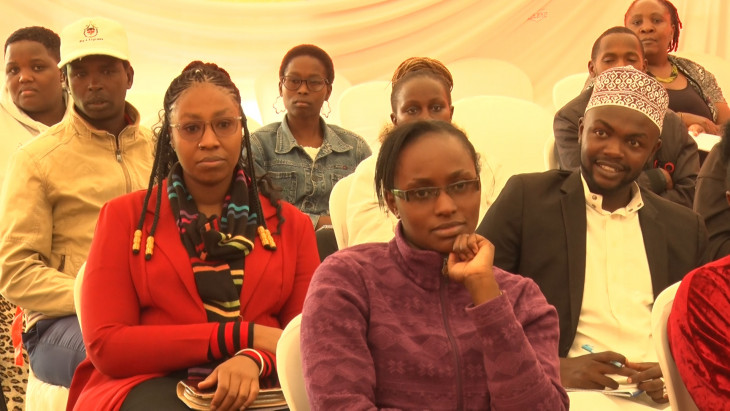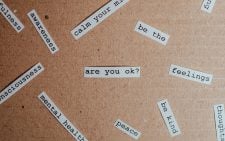Youth attribute suicide to early years of stress

Moses Munene (not his real name), 22, has attempted to commit suicide three times because of minor issues that are common to any other person.
“Whenever I needed little money and my mother failed to give me, I felt like killing myself to punish her. One day, I attempted to drink a whole bottle of undiluted hard drink so that I could die but my plan backfired badly,” he told tens of youths gathered in Narok for a meeting on mental health recently.
He was saved by a close relative who took him to a counsellor at the Narok County Referral Hospital where he underwent a series of counselling sessions.
“I am now too positive in life and every single challenge that comes my way gives me an opportunity to grow. I encourage young people to be optimistic and believe in themselves as each one of us has a unique talent,” he said.
Another young adult Mercy Martin (not her real name), 26, a post-election victim, vividly recalled how she escaped death narrowly after violence broke at the estate she lived in Naivasha after the 2007 election.
“I was in Class Six at a public school in Naivasha. My mother used to work in one of the flower farms when the violence started,” she said.
My neighbours, who also used to be our close friends, she lamented, turned out to be their worst enemies because they did not speak the same language.
“My mother would hide my little sister and I under the bed so that we could not be traumatized by what was happening outside as people would literally hack others to death,” she said amidst tears.
She told the emotional crowd that one day, while traveling to their rural home in Western Kenya to escape the violence in Naivasha, their car was hijacked by unknown people and the women in the vehicle were raped while the men received a thorough beating.
Later, after the violence, her family was referred to the Kenya Red Cross for guidance and counselling sessions.
“I have never talked about the violence before. I am saying this today to warn those threatening to cause chaos in the country ahead, during or after the polls that violence is too bad and the country is greater than any politician,” she said.
“I would not like any individual to suffer what I suffered as it affected my life. Up to date, I do not like going where there are crowds and I’m never comfortable attending a political rally. I like staying in quite places,” she said.
Seek solutions
The two incidents are just some of the nasty experiences youths from different parts of county said they faced in their childhood, that have had very serious effects in their lives and are still being reflected in their adulthood.
The bad experiences have led some youths to engage in bad behavior such as drug abuse, criminal activities, dropping out of school, teen pregnancy and even suicide.
The increasing cases of suicide among young people is the reason why various non-governmental organisations joined hands to hold a youth conference aimed at educating the youngsters on mental health.
Mental health refers to cognitive, behaviour and emotional wellbeing of a person that dictates how a person thinks, feels and behaves.
Conditions such as stress, depression and anxiety could all affect mental health and disrupt a person’s routine.
The meeting held at a Narok hotel was organised by the World Vision in collaboration with Afya Africa, Linda Arts and Beyond Zero Campaign.
According to the World Health Organisation report (2014), Kenya ranks fourth in Africa and ninth in the world with 1.9 million people suffering from mental illness.
A recent study by Gertrude’s Children Hospital estimates that between 20 to 40 percent of Kenyan children may be suffering from mental illness, a situation they attribute to the Covid-19 pandemic.
The Head of Clinical Services at Gertrude’s Hospital Thomas Ngwiri said the pandemic has had a negative effect on children’s mental health because of disruptions in routines, education and family, as well as concern for family income and health which he says spurred anxiety and fear among many young people whose future now seems uncertain.
Empowerment centres
A counsellor working with Beyond Zero Initiative at the Narok County Referral Hospital Monicah Silantoi said human behaviour is formed when one is between six to 12 years.
She encouraged the youth to always seek counseling whenever they were not comfortable saying there is always a solution for every problem they are facing in life.
Silantoi also urged parents to always spend time with their children to understand them and offer the necessary assistance when needed. “It is okay not to be okay. Feel free to disclose your problems to a person you trust whom you are sure will offer you a solution,” she said.
Narok Youth Officer Joash Ratemo encouraged the young people to take advantage of the Youth Empowerment Centres in the county to build their talent instead of staying at home doing nothing.
“The youth centres are equipped with indoor games, ICT training sessions, counselling sessions, capacity building sessions among others. You will always find something to keep you busy and people to share your problems with,” said Ratemo.
During the forum, the youth accused the police of interfering with witnesses whenever they reported Gender Based Violence (GBV) cases. They claimed police failed to record crucial information or did shoddy investigations, making the case weak.
“Sometime they record the statements and intentionally leave out the key witnesses after they are compromised. Other times they fail to preserve the exhibits properly hence compromising the cases. This denies the victim justice in court of law,” said the young people.
Afya Africa Chief Executive Catherine Tito urged the youth not to suffer in silence and encouraged them to visit her office where they will offer the relevant solutions.
Conditions such as depression, anxiety and stress can affect mental health and disrupt a person’s routine, Tito reiterated.
According to Narok Police Commander John Kizito, the number of young people commiting suicide over very flimsy reasons is on the rise.
-KNA











